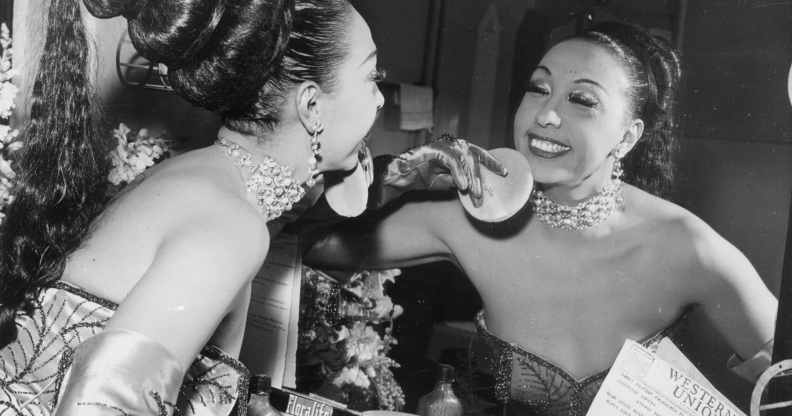Bisexual goddess and anti-Nazi fighter Josephine Baker given one of France’s highest honours

Josephine Baker to be the first Black woman to enter the Pantheon (Hulton Archive/Getty Images)
French-American cabaret star and civil rights activist Josephine Baker has become the first Black woman to enter the Panthéon, nearly 50 years after her death.
The bisexual icon is the sixth woman to be honoured in the mausoleum of revered historical figures in Paris, and one of only three Black people, with author Alexandre Dumas and colonial administrator Félix Éboué also laid to rest in the temple.
The move to enter Baker into the Panthéon, considered one of France’s highest honours, was made after years of campaigning by her family.
President Emmanuel Macron granted the request in August, stating that the entertainer was an “exceptional figure” who “embodies the French spirit”.
Macron’s office said Baker was “a woman whose whole life was looking towards the quest of both freedom and justice”.

Josephine Baker will become the sixth woman to be commemorated in the Pantheon of Paris (Siegfried Modola/Getty Images)
The rare posthumous honour will see Baker join scientist Marie Curie, writer Victor Hugo, philosopher Voltaire and many others, however she will be the first performer in the Panthéon, and the first American-born citizen.
Baker’s body will remain in Monaco, however during Tuesday’s ceremony a coffin containing handfuls of earth from four places where she lived – including her birth city of St Louis, Missouri – was placed in the Pantheon’s crypt.
Macron delivered a speech at the lavish ceremony, saying: “She was on the right side of history every time – she made the right choices, always distinguishing light from obscurity.”
Josephine Baker finally felt ‘liberated’ in Paris
Born in 1906, Josephine Baker led an extraordinary life, reportedly dating Frida Kahlo, becoming a top cabaret dancer, and helping to defeat the Nazis in France through her work as a resistance spy.
Baker was born into poverty; after developing a talent for dance and performing at clubs in Harlem, she left the US at the age of 19.
She moved to France with a dance troupe to escape racial segregation at home, and quickly rocketed to fame.
One of her more infamous performances includes a Charleston dance which she performed wearing a skirt made of rubber bananas.
Talking about her time living in America compared to France, Baker said that she was sick of “living in a country where I was afraid to be Black”.
“It was only a country for white people. Not Black. So I left. I had been suffocating in the United States… A lot of us left, not because we wanted to leave, but because we couldn’t stand it anymore… I felt liberated in Paris.”

Portrait of singer and dancer Josephine Baker (Hulton Archive/Getty Images)
When France declared war on Germany in 1939, Baker began performing for French troops to keep morale high, and she never performed in Paris once the Nazis occupied it.
She became acquainted with an intelligence officer, who recruited her as a spy for the French resistance who helped take down the Nazis.
Following the war, she was celebrated as a hero and awarded the Medal of the Resistance.
Before her death in 1975, she spent her years entertaining and campaigning against racism, going on to adopt 12 children of different ethnicities who she referred to as her “Rainbow Tribe”.
Constructed in the 18th century, the Panthéon currently holds 72 men and five women, recognised for their accomplishments and legacies by France.

